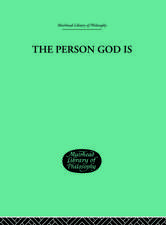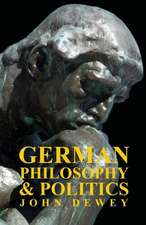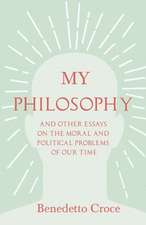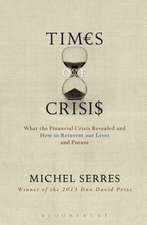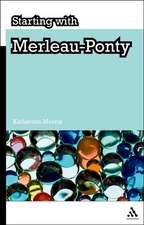Levinas' 'Totality and Infinity': A Reader's Guide: Reader's Guides
Autor Dr William Largeen Limba Engleză Paperback – 29 iul 2015
| Toate formatele și edițiile | Preț | Express |
|---|---|---|
| Paperback (1) | 163.71 lei 6-8 săpt. | |
| Bloomsbury Publishing – 29 iul 2015 | 163.71 lei 6-8 săpt. | |
| Hardback (1) | 494.94 lei 3-5 săpt. | |
| Bloomsbury Publishing – 29 iul 2015 | 494.94 lei 3-5 săpt. |
Din seria Reader's Guides
-
 Preț: 132.80 lei
Preț: 132.80 lei - 5%
 Preț: 164.90 lei
Preț: 164.90 lei -
 Preț: 157.75 lei
Preț: 157.75 lei - 22%
 Preț: 566.78 lei
Preț: 566.78 lei - 19%
 Preț: 496.21 lei
Preț: 496.21 lei - 14%
 Preț: 143.87 lei
Preț: 143.87 lei - 9%
 Preț: 143.41 lei
Preț: 143.41 lei -
 Preț: 147.76 lei
Preț: 147.76 lei - 9%
 Preț: 157.32 lei
Preț: 157.32 lei - 14%
 Preț: 164.13 lei
Preț: 164.13 lei - 14%
 Preț: 165.20 lei
Preț: 165.20 lei - 14%
 Preț: 162.79 lei
Preț: 162.79 lei - 9%
 Preț: 143.87 lei
Preț: 143.87 lei - 8%
 Preț: 158.82 lei
Preț: 158.82 lei - 8%
 Preț: 151.03 lei
Preț: 151.03 lei - 14%
 Preț: 596.23 lei
Preț: 596.23 lei -
 Preț: 164.35 lei
Preț: 164.35 lei -
 Preț: 145.67 lei
Preț: 145.67 lei - 26%
 Preț: 494.94 lei
Preț: 494.94 lei - 8%
 Preț: 158.20 lei
Preț: 158.20 lei - 9%
 Preț: 144.12 lei
Preț: 144.12 lei - 14%
 Preț: 143.66 lei
Preț: 143.66 lei - 14%
 Preț: 176.61 lei
Preț: 176.61 lei -
 Preț: 144.04 lei
Preț: 144.04 lei - 9%
 Preț: 150.33 lei
Preț: 150.33 lei - 14%
 Preț: 143.78 lei
Preț: 143.78 lei -
 Preț: 176.61 lei
Preț: 176.61 lei - 9%
 Preț: 150.77 lei
Preț: 150.77 lei - 14%
 Preț: 151.84 lei
Preț: 151.84 lei - 14%
 Preț: 158.01 lei
Preț: 158.01 lei - 14%
 Preț: 144.04 lei
Preț: 144.04 lei - 20%
 Preț: 175.44 lei
Preț: 175.44 lei - 14%
 Preț: 143.41 lei
Preț: 143.41 lei - 14%
 Preț: 711.26 lei
Preț: 711.26 lei - 22%
 Preț: 595.82 lei
Preț: 595.82 lei -
 Preț: 215.25 lei
Preț: 215.25 lei - 24%
 Preț: 344.07 lei
Preț: 344.07 lei - 14%
 Preț: 151.13 lei
Preț: 151.13 lei - 22%
 Preț: 713.14 lei
Preț: 713.14 lei - 14%
 Preț: 151.21 lei
Preț: 151.21 lei
Preț: 163.71 lei
Preț vechi: 190.74 lei
-14% Nou
Puncte Express: 246
Preț estimativ în valută:
31.34€ • 32.23$ • 26.00£
31.34€ • 32.23$ • 26.00£
Carte tipărită la comandă
Livrare economică 19 februarie-05 martie
Preluare comenzi: 021 569.72.76
Specificații
ISBN-13: 9781472529954
ISBN-10: 1472529952
Pagini: 168
Dimensiuni: 138 x 216 x 15 mm
Greutate: 0.23 kg
Editura: Bloomsbury Publishing
Colecția Bloomsbury Academic
Seria Reader's Guides
Locul publicării:London, United Kingdom
ISBN-10: 1472529952
Pagini: 168
Dimensiuni: 138 x 216 x 15 mm
Greutate: 0.23 kg
Editura: Bloomsbury Publishing
Colecția Bloomsbury Academic
Seria Reader's Guides
Locul publicării:London, United Kingdom
Caracteristici
The first close reading of Totality and Infinity designed for first-time readers and undergraduate students
Notă biografică
William Large is a Reader in Philosophy at University of Gloucestershire, UK. He is the author of Ethics and the Ambiguity of Writing: Emmanuel Levinas and Maurice Blanchot (2005), Maurice Blanchot [co-authored] (2001) and Heidegger's Being and Time (2007)
Cuprins
Table ofContents1.Themes and Content2.Reading the Text3.Reception and Influence4.Further ReadingBibliographyIndex
Recenzii
Admirable ... [and] accessible ... [Large's book] considers many of the obvious questions a new reader is likely to have.
When he first encountered the difficult work of Emmanuel Levinas, this reviewer threw one of Levinas's books against the wall in exasperation. Had Large's book been available, the experience would have been different. Levinas's style, his methodology, his vocabulary, and his argument can seem strange. In introducing readers to Levinas's most influential text, first published in French in 1961, Large (Univ. of Gloucestershire, UK) begins by working through the basics of phenomenological methodology and Levinas's relation to Jewish philosophy as the assumed contexts in which Totality and Infinity occurs. After this framing, the author moves carefully through the work, offering specific analysis and interpretation of each section in turn. He concludes with a look at several problems that seem to plague Totality and Infinity-presentation, politics, the feminine, and religion. Large's account is fair and his style is accessible. His book will be an invaluable resource for students who are tempted to throw Totality and Infinity against the wall. Summing Up: Highly recommended. Lower- and upper-division undergraduates; graduate students.
Large's contribution is valuable in making accessible this fundamental text for the understanding of the thought of Emmanuel Levinas ... He eloquently guides the reader through the intricacies of Totality and Infinity ... A necessity in the library of all those studying Levinas.
Students faced with the daunting task of reading Totality and Infinity have long awaited a lively and accessible commentary-and this is it. Large straightens out the warp and weft of Levinas's text with admirable brevity, clarity, and faithfulness. Large's guide deserves to be read by students and anyone with a serious interest in reading Levinas's most important philosophical work for the first time.
I can think of no better guide through the "thicket of difficulties" that is Levinas' Totality and Infinity than Will Large's book. This is a book that is engagingly written and straightforward, whilst also remaining alive to the nuance and complexity of Levinas' notoriously difficult text. Those embarking upon Levinas for the first time will find this book an invaluable introduction to the intrigue and fascination of Levinas' work. Meanwhile, those who are more familiar with Levinas' work may find that this refreshing and stimulating book opens up new questions for them, and helps them forge new pathways for the exploration of Levinas' ethics of responsibility.
This reader's guide is a lucid, accessible way into an extremely difficult book, which offers the reader not only solid footing within Levinas's thinking but also occasional bridges into further philosophical discussions. Readers will appreciate patient explanation of his terminology, clear summaries of notoriously dense passages, and frequent reminders that many of Levinas's questions have also been the questions of other major thinkers, such Plato, Kant, Rosenzweig, and Heidegger.
When he first encountered the difficult work of Emmanuel Levinas, this reviewer threw one of Levinas's books against the wall in exasperation. Had Large's book been available, the experience would have been different. Levinas's style, his methodology, his vocabulary, and his argument can seem strange. In introducing readers to Levinas's most influential text, first published in French in 1961, Large (Univ. of Gloucestershire, UK) begins by working through the basics of phenomenological methodology and Levinas's relation to Jewish philosophy as the assumed contexts in which Totality and Infinity occurs. After this framing, the author moves carefully through the work, offering specific analysis and interpretation of each section in turn. He concludes with a look at several problems that seem to plague Totality and Infinity-presentation, politics, the feminine, and religion. Large's account is fair and his style is accessible. His book will be an invaluable resource for students who are tempted to throw Totality and Infinity against the wall. Summing Up: Highly recommended. Lower- and upper-division undergraduates; graduate students.
Large's contribution is valuable in making accessible this fundamental text for the understanding of the thought of Emmanuel Levinas ... He eloquently guides the reader through the intricacies of Totality and Infinity ... A necessity in the library of all those studying Levinas.
Students faced with the daunting task of reading Totality and Infinity have long awaited a lively and accessible commentary-and this is it. Large straightens out the warp and weft of Levinas's text with admirable brevity, clarity, and faithfulness. Large's guide deserves to be read by students and anyone with a serious interest in reading Levinas's most important philosophical work for the first time.
I can think of no better guide through the "thicket of difficulties" that is Levinas' Totality and Infinity than Will Large's book. This is a book that is engagingly written and straightforward, whilst also remaining alive to the nuance and complexity of Levinas' notoriously difficult text. Those embarking upon Levinas for the first time will find this book an invaluable introduction to the intrigue and fascination of Levinas' work. Meanwhile, those who are more familiar with Levinas' work may find that this refreshing and stimulating book opens up new questions for them, and helps them forge new pathways for the exploration of Levinas' ethics of responsibility.
This reader's guide is a lucid, accessible way into an extremely difficult book, which offers the reader not only solid footing within Levinas's thinking but also occasional bridges into further philosophical discussions. Readers will appreciate patient explanation of his terminology, clear summaries of notoriously dense passages, and frequent reminders that many of Levinas's questions have also been the questions of other major thinkers, such Plato, Kant, Rosenzweig, and Heidegger.




